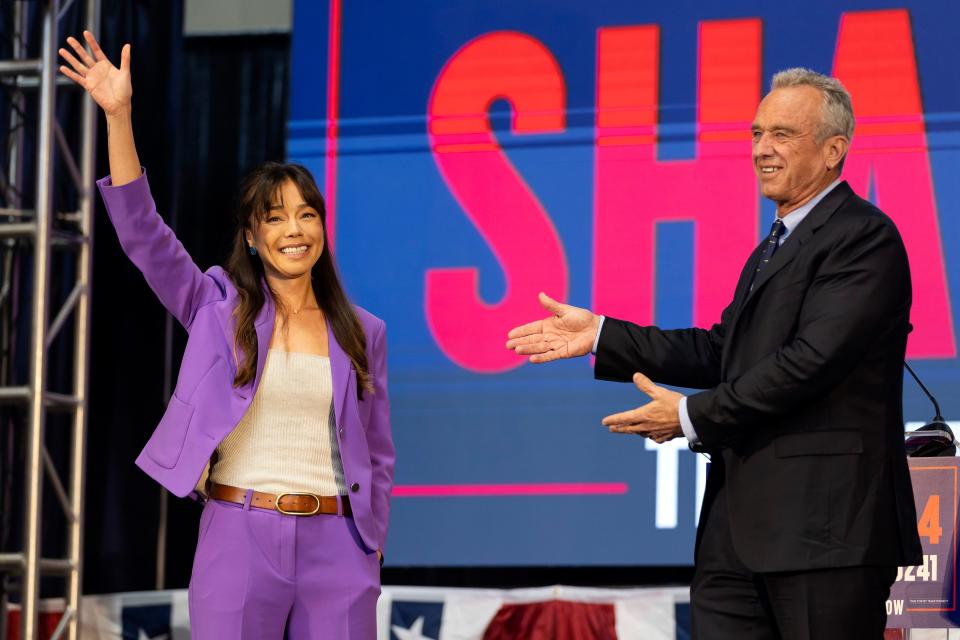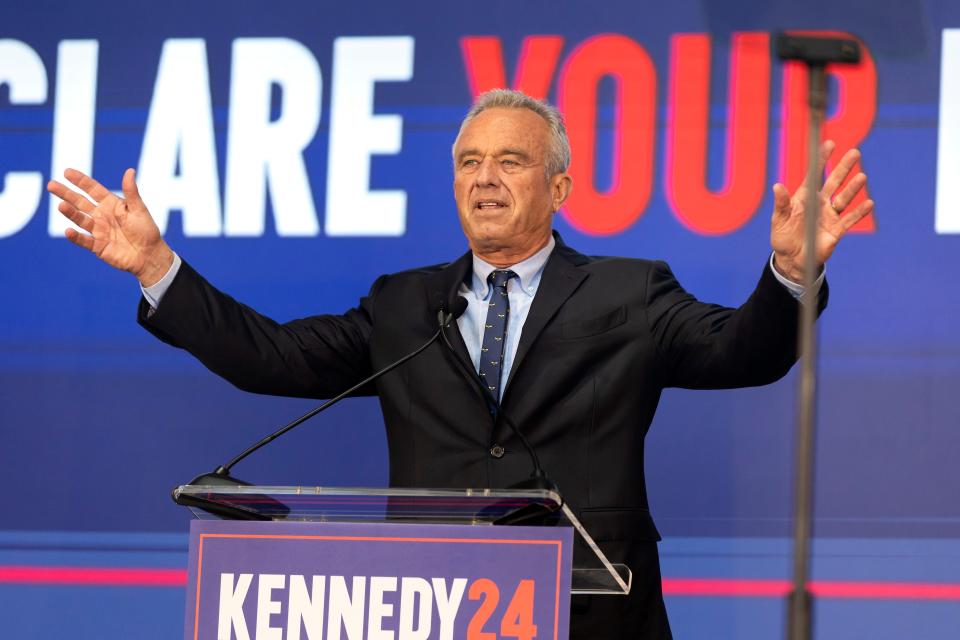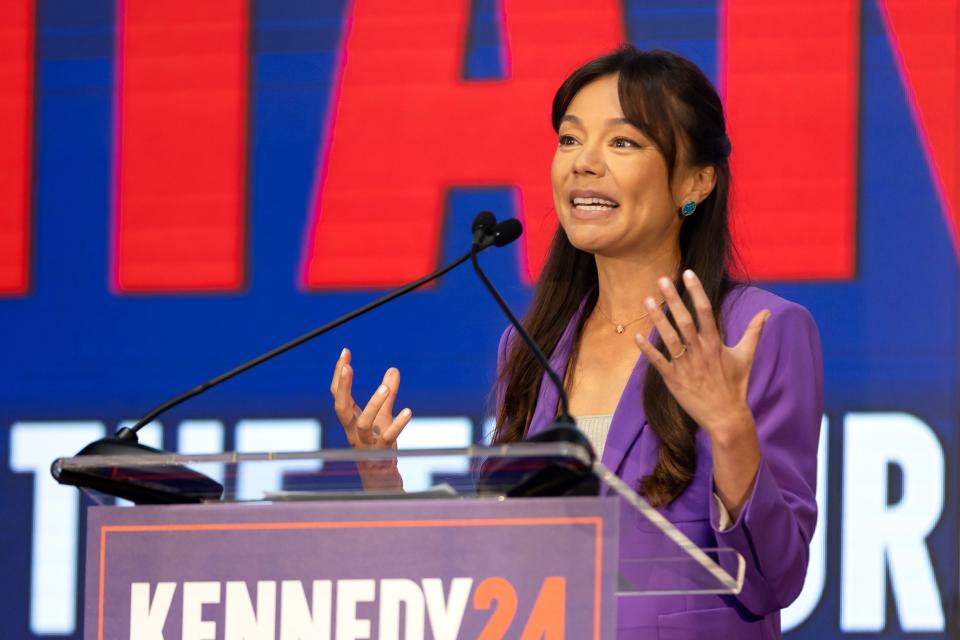RFK Jr. picks running mate. What to know about philanthropist Nicole Shanahan
OAKLAND, California ? Lawyer and philanthropist Nicole Shanahan will be Robert F. Kennedy Jr.'s running mate in his long-shot bid for the U.S. presidency, the pair announced Tuesday.
Kennedy made the announcement at a campaign event in Oakland, her hometown.
About 500 people filled the floor of the Henry J. Kaiser Center for the Arts and more than 30,000 tuned into the livestream with many suggesting their favorite vice presidential picks, ranging from former U.S. Congresswoman Tulsi Gabbard (D-Hawaii) to New York Jets quarterback Aaron Rodgers.
He said he liked her for her commitment to health and organic foods and "deep, inside knowledge" of how the technology industry uses artificial intelligence to manipulate the public and identify government abuses. He also wanted an athlete, he said, describing Shanahan as an avid surfer and a softball player in her youth. He wanted, he said, a gifted administrator, an inquiring mind, someone open to changing her opinions, who is spiritual, idealistic and "above all (someone with) a deep love for the United States of America."
In some ways, Shanahan was an odd choice. A registered Democrat, she has no political or executive experience and most of her philanthropic support has gone to mainstream science ? while Kennedy, who quit the Democratic party last fall, has made a national reputation dismissing the scientific findings of vaccine developers and public health experts.
In other ways, though, the 38-year-old, makes a lot of sense. She has already donated more than $4 million to his campaign, including the lion's share of funding for a 30-second ad during the Super Bowl.

The ex-wife of Google co-founder Sergey Brin and a long-time Silicon Valley resident, Shanahan has connections throughout the tech world. Kennedy has tried to cultivate support within the technology sector, including making an appearance at the SXSW conference in Austin earlier this month.
Kennedy said she understands better than either mainstream candidates the "promise and peril" of technology.
Choosing a running mate
Shanahan's youth and wealth may help Kennedy, who is 70 and a member of the closest Americans come to having a political royal family. But really, several political scientists said, his choice of a running mate, isn't all that significant.
"The chances of this person becoming vice president are close to zero," said Peter Ubertaccio, a professor of political scence and vice president for academic affairs at Stonehill College in Easton, Massachusetts. No third-party candidate has won the U.S. presidency in well over a century.
"The nomination of Ms. Shanahan will make no difference whatsoever in Kennedy's bid," added Jeffrey Berry, a political science professor emeritus at Tufts University in Medford, Massachusetts. "People don't vote for vice president. They vote for president."
But the choice of running mate is the first significant decision a presidential candidate has to make and therefore reflects on them, said Christopher Devine, an associate professor of political science at the University of Dayton in Ohio.

Voters want to see a vice presidential candidate they could imagine in the White House, said Devine, co-author of of the book "Do Running Mates Matter?" "There's good evidence that when people see a VP pick who is not instantly a credible vice president they question a presidential candidate's judgement and they're less likely to vote for that person."
Devine said the selection of Shanahan was not a good look for Kennedy. "This is not the kind of move you would make if you truly anticipated becoming the next president of the United States," he said.
Someone like Kennedy who lacks any governing experience would be expected to choose a running mate with some expertise in foreign policy or negotiating with Congress, he said. Even Donald Trump, who famously had no political experience in 2016 when he ran for president the first time, chose Mike Pence as his running mate ? a former Congressman and Indiana governor.
The main reason to choose Shanahan, Devine said, seems to be for her money. As a running mate, she is not limited by campaign contribution limits.
How they're selected: What we know now about choosing a running mate and its impact on voters
It may help Shanahan to be a VP candidate, Berry said, if she has political ambitions in her home state of California, but probably won't raise her national profile much, unless she's willing to fund a major national tour for herself in addition to Kennedy, complete with an advance team and communications people.
Nicole Shanahan's personal life
Shanahan, who declined several requests from USA TODAY for an interview, is the daughter of a Chinese immigrant mother and a father of German-Irish descent who suffered from schizophrenia and bipolar disorder.
In a video and a half-hour speech, she mentioned her difficult childhood, growing up in Oakland. Her family depended on welfare for a time, living "one misfortune away from disaster," as her father's struggles repeatedly cost him jobs.
In her junior year of high school, she traveled to El Salvador, which was then still recovering from a 12-year civil war. The experience turned her into a pacificist and peace activist ? which at the time meant leading her fellow students on a march to the local radio station.

She attended college at the University of Puget Sound and then worked as a paralegal and patent specialist for a number of years.
Her first marriage to San Francisco investor and finance executive Jeremy Asher Kranz reportedly lasted from 2013 to 2015. She was attending the Santa Clara University School of Law at the time, graduating in 2014.
She reportedly met Brin that year at a yoga retreat and the pair married in 2018, the same year their daughter Echo was born. They separated in 2021 and divorced last year.
It's unclear how much money she received in their confidentical divorce proceedings, but in 2022, Brin donated $23 million worth of shares in Alphabet, Google's parent company, to the philanthropy she founded and presides over, the Bia-Echo Foundation.
Shanahan provided $4 million to support a controversial $7 million Kennedy advertisement that ran during the Super Bowl. Last year, she donated $500,000 to the pro-Kennedy group Common Sense and the legal limit of $6,600 last year to Kennedy's campaign. She has donated to other candidates in the past, including Biden's 2020 campaign and Hillary Clinton's 2016 White House bid.
She founded ClearAccessIP, a Palo Alto-based lawfirm that helps patent owners manage and monetize their intellectual property right, which she sold in 2020. She remains listed as a research fellow at CodeX, the Stanford Center for Legal Informatics, which she described as focusing on "humanistic coding."
She was photographed on red carpets with Brin a number of times, and was alleged by the Wall Street Journal to have had an affair with Elon Musk, which both she and Musk repeatedly denied. She told People magazine in a story addressing her reaction to the negative publicity, that the two were friends and she spoke with him about whether his company Neuralink could provide assistance to Echo, who has autism.
She blamed the end of her marriage not on an affair, but on the challenges of "living as a wife of a billionaire."
"I was not the best version of myself,” she told the magazine. “I felt conflicted every day, like I couldn’t access the thing that made me what I am.”
Last May, Shanahan reportedly held a "love ceremony" with Jacob Strumwasser, a vice president at Lightning Labs, whom she met at the Burning Man festival in 2022.
Shanahan's philanthropy
Shanahan said her childhood of deprivation and priveleged adulthood have taught her that "the purpose of wealth is to help those in need."
To that end, she has devoted most of her public activities in recent years to health philanthropy, mainly in the areas of autism, "food as medicine," and female aging. "Healthy soil is the foundation of healthy food," she said and "our answer to the climate crisis."
She was a "convening participant" and a financial supporter of President Joe Biden's 2022 Task Force on Hunger, Nutrition and Health, though she said Tuesday that she has left the Democratic party because it is not living up to its ideals.
She has also committed $100 million over the course of her lifetime to promoting female longevity and has already seeded the creation of the Buck Institute's Center for Reproductive Longevity and Equality with a $6 million donation, in addition to a $20 million contribution toward the creation of a global consortium promoting women's reproductive health and longevity.
Shanahan has said she became interested in female reproductive health after facing fertility issues before conceiving Echo.
Jennifer Garrison, the scientist who runs both the center and the global consortium, said Shanahan's contributions have been essential to bringing attention and much-needed support to an underfunded area of research that could help better explain aging for everyone.
Although half the world's population is female, little is known about how and why ovaries age faster than the body's other tissues, and the other roles ovaries play in human health.
"What we're talking about is not just young women who are having fertility issues, not just women in perimenopause or going through menopause, but we're talking about a woman's entire adult life," Garrison said. "We don't understand how female bodies work at any point in adult life ? but we can. This is all knowable. None of this is rocket science. We just have to literally collect the data."
Shanahan was the first philanthropist to see the importance of digging into this science, learning more and helping women age better, she said.
Shanahan's platform
Shanahan spoke passionately about the importance of curing people from the chronic diseases that are plaguing them ? diseases she believes are caused by modern life. Curing them, she said, will cure America.
"What is possible for the human being is also possible for our nation," she said.
She blamed chronic illnesses like the infertility she suffered, her daughter's autism and rampant mental health challenges on three major causes.
First, she said, endocrine disruptors in food and chemicals in our environment make it harder for the body to heal.
Electrochemical exposures from wireless technologies and devices, such as cell phones, compound the problems, she said.
And medications, often prescribed to treat problems caused by the first two actually exacerbate them, she said. She did not name vaccines, but Kennedy is known for his anti-vaccine stance.
All three claims have limited or no scientific support.
As vice president, Shanahan said she would address those concerns by using artificial intelligence to examine medical data bases. "We just have to ask the right questions, do the right research and apply the right tools," she said. "We have to rid science of the corporate bias … and throw this into reverse."
She concluded by promising voters "to make this world a little less crazy."
Karen Weintraub can be reached at [email protected].
This article originally appeared on USA TODAY: RFK Jr.'s VP pick is Nicole Shanahan: philanthropist, Sergey Brin ex

